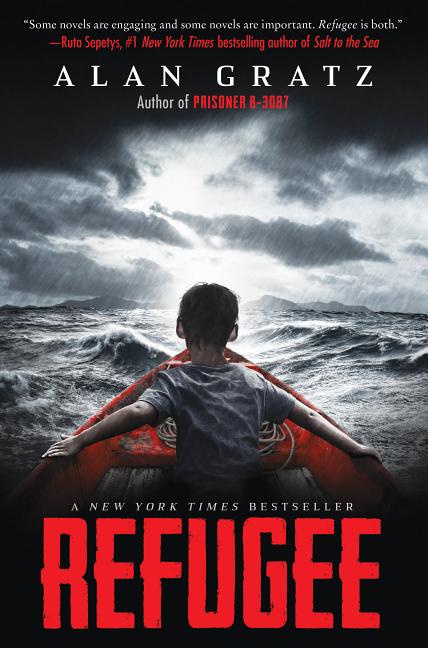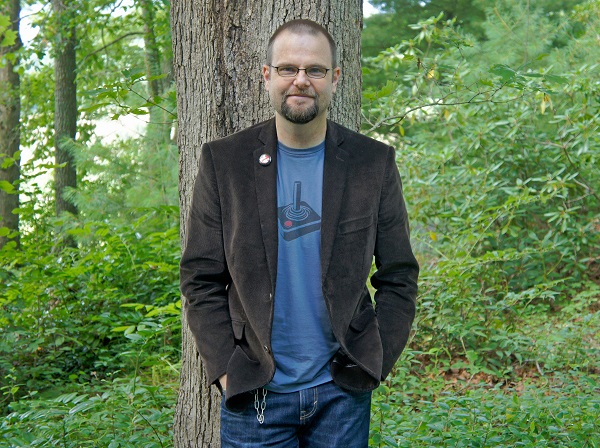Meet-the-Author Recording with Alan Gratz
Refugee |
Alan Gratz introduces and shares some of the backstory for creating Refugee.
Translate this transcript in the header View this transcript Dark mode on/off
Alan Gratz: Hi, I'm Alan Gratz, the author of Refugee. I'd like to share with you a little bit about how this story came about and then read a short excerpt for you. The story of Refugee began with the MS St. Louis, a real ship that set sail from Nazi Germany in early 1939 with 937 passengers on board, almost all of them Jewish refugees bound for Cuba. I was still looking for a way into the story of the MS St. Louis for young readers when my wife and daughter and I took a family vacation to the Florida Keys in early 2015.
One morning, we got up to walk along the small patch of beach in front of our resort, and we ran right into a homemade boat that someone had used to come to America. There was room on the wooden benches for 13 people, and abandoned clothing and plastic water bottles still littered the floor. The back end had an old, rusty engine that had been yanked out of a car or tractor and was attached to a propeller shaft. There were plastic paint buckets to bail it out along the way, and the whole bottom of the boat and all the seams were covered with Great Stuff, that foam insulation that comes from a spray can. That, and the painted plywood walls were all that kept the seawater out.
One day, the boat wasn't there, and the next day, it was. Whoever had been aboard had arrived in the night while we were sleeping just a few hundred yards away from our room. The day before, while my daughter had been swimming in the pool and my wife and I had been reading books in hammocks in the shade, whoever had been onboard this boat had been steering north, avoiding oil tankers and sharks and the American Coast Guard in a desperate, dangerous attempt to find refuge in America.
That boat was a wake-up call for me. I knew that immigrants and refugees were trying to reach America every day by land, air, and sea, through channels official and unofficial, but because I didn't live at the front lines of that struggle, I didn't see it every day and out of sight was definitely out of mind. I wanted to do something about that. I wanted to write a book about the MS St. Louis, but I also wanted to write a book about Cuban refugees and then, every day, doing their part to make sure that none of us forgot, newspapers and news channels and the internet were showing us devastating image after devastating image of the refugee crisis caused by the Syrian Civil War.
The Syrian Civil War began in 2011 and is still going on. More than two million Syrians have been killed or injured and six plus years of war have left around 11 million Syrians, half their entire population, homeless. I wanted to write a book about the MS St. Louis, and I wanted to write a book about Cuban refugees, and now I wanted to write a book about the Syrian refugee crisis too. And then I realized I could write a book about all three. I would tell the story of Josef, a Jewish boy trying to escape Nazi Germany for Cuba with his family onboard the MS St. Louis in 1939, of Isabel, a Cuban girl trying to escape Communist Cuba with her family for America onboard a raft in 1994, and of Mahmoud, a Syrian boy trying to escape the Syrian Civil War for Germany with his family in the present day.
My sincere hope for young readers who pick up Refugee is that it, like that homemade raft that I stumbled across in Florida, makes the invisible visible again. The passage I'll be reading for you is from Mahmoud's story.
"The vacationers dropped their voices, and even though Mahmoud couldn't understand what they were saying, he could hear the disgust in their words. This wasn't what the tourists had paid for. They were supposed to be on holiday seeing ancient ruins and beautiful Greek beaches, not stepping over filthy, praying refugees. 'They only see us when we do something they don't want us to do,' Mahmoud realized. The thought hit him like a lightning bolt. When they stayed where they were supposed to be, in the ruins of Aleppo, or behind the fences of a refugee camp, people could forget about them.
But when refugees did something they didn't want them to do, when they tried to cross the border into their country or slept on the front stoops of their shops or jumped in front of their cars or prayed on the decks of their ferries, that's when people couldn't ignore them any longer. Mahmoud's first instinct was to disappear below decks, to be invisible. Being invisible in Syria had kept him alive. But now, Mahmoud began to wonder if being invisible in Europe might be the death of him and his family. If no one saw them, no one could help them, and maybe the world needed to see what was really happening here."
This Meet-the-Author Recording with Alan Gratz was exclusively created in August 2017 by TeachingBooks with thanks to Scholastic.



